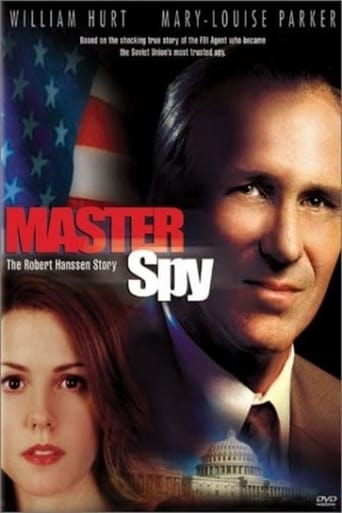

There really is no point in arguing over what drove Hanssen(although it is interesting to note the strong, equivocal feelings he seems to arouse). Hanssen will always be a deeply controversial and contradictory character.What should be celebrated about Masterspy is the fact that the filmmakers didn't take the easy option and try to simplify Hanssen in order to please nonplussed viewers. Indeed, in an interview Mailer, who wrote Masterspy, said he found Hanssen the most fascinating living subject he has ever studied, and this shows in his careful, even a little obsessive screenplay. And Schiller's subdued, unfussy direction only highlights his own fascination with Hanssen in the form of his leading man, William Hurt. And Hurt really delivers as his performance drives the film- I can't think of another actor, let alone an American, who would dare portray Mailer's strange Hannsen and grasp his confused, contradictory but insatiable needs. In his endeavour, Hurt is strongly supported by inspired company who maximise their own well-written roles, Boyle's seedy, sadistic father Howard, Mary-Louise Parker's loving wife Bonnie, Ron Silver's sympathetic boss Mike, and Sthraitern's strange best friend Jack (though even he comes across as pretty normal alongside Hanssen!).Television is increasingly becoming the only place for focused, thoughtful studies of complex characters in adult situations. And Masterspy is Television at its best. Still, it is not perfect. Mailer's old-fashioned view of women does affect the film slightly, especially in the case of a one-dimensional harridan female FBI intern, and Louise-Parker's Bonnie cries out for more screen time. Perhaps this is part of a more general fault, which is that the film needed to be longer (it seems too long for a TV Movie and too short for a Mini Series, and as far as I can understand has been billed as both). More detail on Hannsen's youth would have been desirable (perhaps a young actor to fill in for the Middle Aged Hurt?) and Hannsen's bizarre relationship with his best friend Jack needed more screen time.
... View MoreThis film contains one of William Hurt's best performances and anybody who is an acting fan in general or a William Hurt fan in particular will enjoy it.I thought that the ideology of the film was quite complex, but ultimately dishonest and reactionary. The film wants to convince us that Robert Hanson was only a strange mentally-ill man who betrayed his family, friends, religion, colleagues and country. They have little sympathy for his painful situation.If one looks at the facts that the story presents, instead of the way the movie presents them, this is clearly not the case. Hanson has to choose between his family, friends and religion and his government and job. He chose his family, friends and religion over his job and his government. He was simply a very intelligent man in an incredibly difficult position. If he had not sold secrets to the Soviet Union and Russians, he could not have afforded the lifestyle to maintain his family, friends and religion. His alternative was to lose his job and everything he loved most in life. His choice can be seen as incredibly courageous on some level.The producer Lawrence Schiller and the writer Norman Mailer are very rich men who do not have to worry about making money every day (as Hanson did).The film deserves credit for at least raising some quite interesting lines of defense for Hanson. For example, the film brings up the point that it is possible that his actions of helping the Soviets and Russians actually made the world a safer place and saved the world from nuclear catastrophe. The film should have seriously considered that in betraying his country, he may have saved the human race. Instead, the film presents this as merely one more fantasy on the part of Hanson.
... View MoreNorman Mailer and Lawrence Schiller have collaborated four times for TV; they specialize in examining the life of somebody who is talented, a high achiever and desperately unhappy. Marilyn Monroe, O. J. Simpson and Robert Hanssen certainly achieved much, while it might be argued that Gary Gilmore (The Executioner's Song) managed to bring capital punishment back to the United States.I did not see much success in bringing Hanssen to life. Admittedly he's a very strange bird, a loner in an organization (the FBI) that prizes teamwork and conformity above all else. It seems he could never manage to conceal his disdain for the mediocrity he saw all around him in the New York office. The most telling moment comes in the park with Ron Silver, his boss telling him he's got to dumb down and play the game if he ever expects to rise in the ranks. The expression on William Hurt's face is an amalgam of contempt, self-pity and a touch of Why Me, Anyhow.
... View MoreA very interesting story but very uneven and hard to follow. Robert Hanssen was a very complex man and possibly the writer should not have tried to capture him in all his complexities. None the less, worth your time in learning the story about America's most damaging spy.
... View More